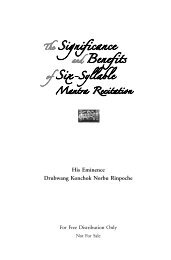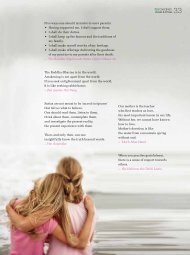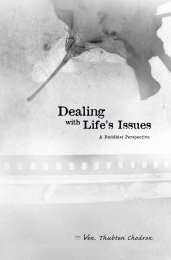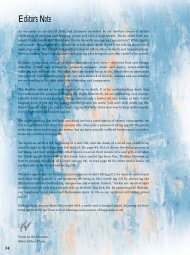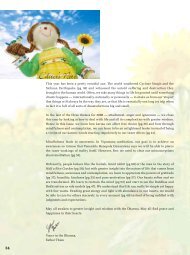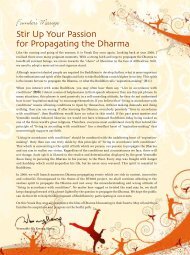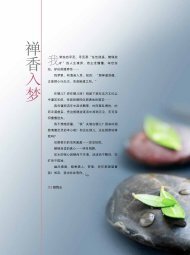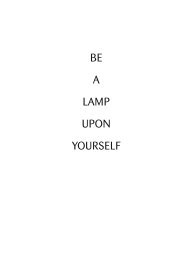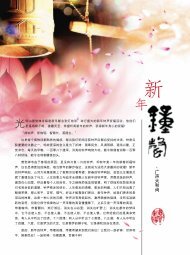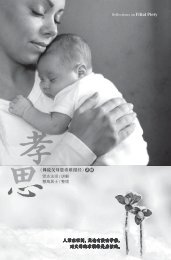Editor's Note - Dharma Resources - Kong Meng San Phor Kark See ...
Editor's Note - Dharma Resources - Kong Meng San Phor Kark See ...
Editor's Note - Dharma Resources - Kong Meng San Phor Kark See ...
Create successful ePaper yourself
Turn your PDF publications into a flip-book with our unique Google optimized e-Paper software.
there is hope. I firmly believe that it is possible to<br />
transform the garbage dump into something better,<br />
but we have to start at where we are.<br />
you do not believe in the path and the goal that the<br />
Buddha explained, you will not follow the method<br />
to get there.<br />
If we do not take refuge, even though<br />
we may create a lot of good karma, that<br />
karma will not be dedicated for the<br />
attainment of enlightenment, because<br />
we have no faith in enlightenment and<br />
no faith in the Buddhist path.<br />
So this first step of making a commitment, becoming<br />
a Buddhist, entering into the Buddhist path, really<br />
clarifies where we are<br />
going. Then when we<br />
create good karma we<br />
can dedicate it for the<br />
attainment of enlightenment.<br />
Whereas, if<br />
we do not really have<br />
much confidence in<br />
the Buddha, <strong>Dharma</strong>,<br />
<strong>San</strong>gha, we may create<br />
good karma but we<br />
will not dedicate it for<br />
the attainment of enlightenment<br />
because if<br />
you do not believe in<br />
enlightenment,<br />
why<br />
would you dedicate<br />
the good karma for<br />
that<br />
Three Sets of Vows<br />
Refuge serves as the foundation for taking any<br />
further vows or initiations. There are actually<br />
three sets of vows that one can take as a Buddhist.<br />
The first level is called pratimoksha or individual<br />
liberation vows. These include the five lay precepts,<br />
the monks and nun’s vows and also one-day vows.<br />
The second type of vows is called the bodhisattva<br />
vows. The third type is the tantric vows. These are<br />
Do You Know...<br />
awaken<br />
52<br />
We Establish the<br />
Foundation For Taking All Further Vows<br />
The next benefit of taking refuge is that it establishes<br />
a foundation for taking all further vows. The reason<br />
for this is that taking refuge confirms in us that we<br />
want to attain liberation. Taking refuge confirms<br />
that we want to follow the path set out by the Buddha<br />
and thus having confirmed that, it sets the stage<br />
so that we can actually take the different levels of<br />
precepts or vows that can help us accumulate good<br />
karma and help us abandon our habitual confused<br />
behaviour.<br />
Also, if your refuge is very strong you will keep your<br />
vows well. If your refuge is not very strong, then you<br />
will not keep your vows well. If you have not taken<br />
refuge, then you will not follow the precepts. If<br />
in order of how easy or difficult it is to keep them.<br />
In other words, the individual liberation vows are<br />
the easiest to keep because they point out physical<br />
and verbal behaviours that are to be abandoned. The<br />
bodhisattva vows are more difficult to keep because<br />
they point out mental behaviours to be abandoned,<br />
as do the tantric vows which are even more difficult<br />
to keep.<br />
Nowadays, because initiations are given very freely,<br />
sometimes people’s first exposure to Buddhism is<br />
through an initiation. They might say something<br />
like, “I’ve taken this and that initiation but I am not<br />
a Buddhist.” Actually, refuge vows are given as part<br />
of the initiation ceremony, but if the person does not<br />
consider himself a Buddhist then he has not taken





